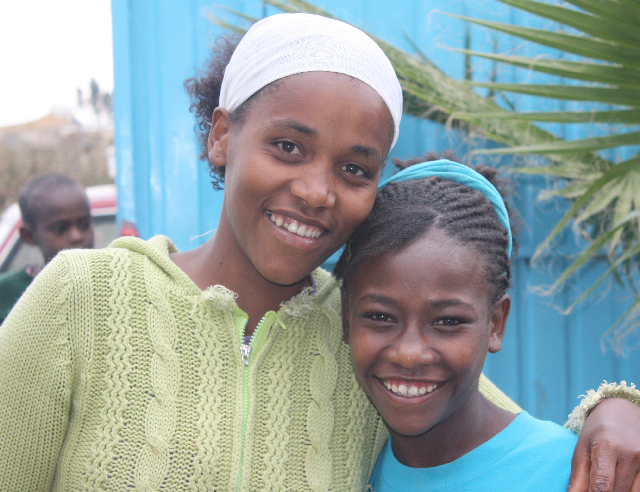TFC believes hope is available to the family-less children of our world through the Gospel and by becoming a part of a family. Adding Ethiopia into the equation means that these children need to leave the streets as well. So, The Forsaken Children’s equation for ministering to Ethiopia’s family-less children looks something like this: Gospel + Leaving Streets + Family = Lasting Hope
The Gospel Let’s start with the Gospel. It is our belief that this is a central element to changing lives and children coming from a family-less past desperately need life change. This part of the equation is so important because the Holy Spirit plays a huge roll in guiding the child through each additional part of the equation. Sometimes, apart from the Holy Spirit working in the children’s lives, it seems like some of the children have no hope of ever being placed into a family. For street children it takes supernatural power to change their behaviors, attitudes, and addictions. Without this variable, the sum will often be skewed.
 |
|
| Nebiyu |
Take Nebiyu for instance. Prior to accepting Jesus as his Savior, Nebiyu could not stay off of the streets. Despite all of CHE’s efforts Nebiyu would come and go between his mother’s home and his home on the streets. Finding Nebiyu in rags with bloodshot eyes in Meskel Square (a large area in Addis Ababa) was not an uncommon experience for Nega or Bisrat, CHE staff members. The Lord radically changed this little boy when he took control of his life. Recently, a returning visitor to CHE did not even recognize Nebiyu, whom the visitor had met only 1 year earlier. Today Nebiyu is bright eyed, loving, healthy, in school, and in CHE’s Halfway Home.
TFC’s first approach in responding to Ethiopia’s family-less children is sharing the gospel with the children in its care and discipling those who come to know Jesus as Savior.
Leaving the Streets Leaving the streets sounds like an easy step, right? Unfortunately this is not always true for street children. For them, the streets represent a beautiful thing, freedom. To leave the streets would mean leaving the freedom to sleep, play, sniff glue, smoke cigarettes, and have sex anytime they please. Some street children also struggle with the concept of being confined behind the walls of a home, because what they know are the wide-open streets.
It typically takes between 6 to 9 months for street children who come to CHE’s Drop-In Center to be ready to leave the streets behind. This involves a long process of counseling, teaching, mentoring, and basically reestablishing trust of adults with these children. Sometimes it takes longer for some children than others, but the key is consistently loving these children, no matter how they treat you.
 |
|
| Metu with Halfway Home house mother, Abazu |
Metu is an example of a former street child who had a hard time leaving the streets and trusting adults. After living most of her life on the streets and without any parental figure, Metu did not trust anyone. The most difficult part of her transition off of the streets came when she actually entered a home after the Drop-In Center phase. She could not handle the direct attention she received from her first foster parents and eventually ran away from the home. After some time passed Metu came back to CHE and was placed in the newly established Halfway Home. Metu has faced many of the same challenges she faced in her foster family at the small Halfway Home, which is family modeled. After months of fighting with the house parents and testing every ounce of their commitment, Metu began to relax and act like a normal child. Today Metu is consistently happy and loves her Halfway Home family. Maybe she needed to prove to herself that these adults were not going to leave her, no matter what she threw their way.
TFC’s second approach in responding to Ethiopia’s family-less children is to help children leave the streets behind for good.
Family Family is so key to a child’s healthy development. Could you imagine growing up without any adult caring for your needs? It is a child’s primary caretaker that teaches him or her most of what is important to future success. From using the toilet to how to communicate with others, from how to get dressed to how to be self-controlled, from when to sleep to who to trust are just some of the basic and not so basic lessons many of us learned from our parents. Not only this, but having a primary caretaker establishes a child’s ability to attach to another human being healthily or even at all. This foundational relationship often forms the path of all future relationships.
Providing the closest thing possible to a family for family-less children is the final part of our equation. This part of the equation is still in the development phase for TFC as we grapple with different experiences and the culture that we have in Ethiopia. Are foster families a possible alternative? That question still is yet to be answered as we help CHE begin to build this very important variable in the equation. For children in CHE’s Halfway Homes, it is becoming apparent that they are ready for forever families. Anything else, an orphanage, a long-term group home (like our current Halfway Home), or the like, will only partially provide what the children really need – a primary caretaker who is consistent and cares for them without anything in return (i.e. a paycheck).
 |
|
| Ephrem |
Ephrem came to CHE almost two years ago after being taken from his home in the countryside, forced to work in a sweatshop for years, and then living on the streets once he escaped the sweatshop. After going through the Drop-In Center phase, this little boy was placed into a foster family. Ephrem thrived as soon as this small, poor family began to love him as their own. Today Ephrem is one of the best, if not the best, behaved children involved in CHE’s ministry. He has a mom, a dad, and a sister who love him because he is Ephrem, not because they get anything in return. Now that’s powerful stuff! The question now, are there other families like Ephrem’s foster family within Ethiopia’s impoverished reality? I believe the answer is yes, but now they have to be found.
TFC’s third approach in responding to Ethiopia’s family-less children is still under construction, but our core belief is that it must involve placing them into families.
